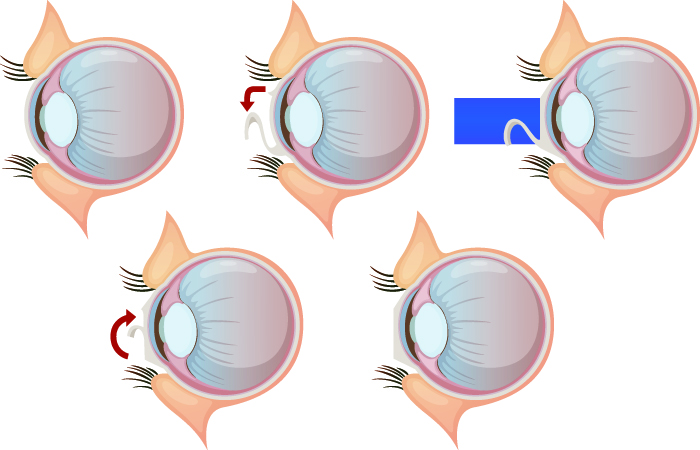Corneal Surgery in Karol Bagh, Delhi
Overview of Corneal Surgery
The cornea is a dome-shaped transparent layer on the surface of the eye. It is where the light first strikes the eye; it enables us to see clearly. Additionally, the cornea protects the eyes from dirt, germs, other foreign particles, and ultraviolet light. A corneal surgery helps reduce eye pain, restore vision, and enhance the appearance of a diseased or damaged cornea.
About Corneal Surgery
Corneal surgery is a procedure where a part of the cornea is replaced with corneal tissue from a donor. During a corneal surgery, the surgeon removes damaged corneal tissue and replaces it with healthy tissue from a deceased donor’s eye. For a majority of patients, corneal surgery restores vision and also improves the quality of life.

Who Qualifies for Corneal Surgery?
Anyone who has a damaged cornea and experiences the following symptoms is eligible for corneal surgery:
- Cloudy vision
- Blurred vision
- Eye pain
However, an ophthalmologist would determine the exact cause of the pain and blurred vision and suggest treatment options to resolve the symptoms. However, if the damaged or diseased cornea is beyond repair, the ophthalmologist recommends a corneal transplant.
Why is Corneal Surgery Conducted?
Corneal surgery is usually performed to restore the vision of a person with a damaged cornea. Additionally, corneal surgery relieves pain and other symptoms associated with the issue.
Corneal surgery is usually conducted for the treatment of
- A bulging cornea
- Swelling of the cornea
- Fuchs’ dystrophy (hereditary condition)
- Corneal ulcers
- Cornea scarring caused due to an infection or injury
- Complications due to previous surgery
- Thinning or tearing of the cornea
Request an appointment at Apollo Spectra Hospitals, Karol Bagh, New Delhi
Call 1860 500 2244 to book an appointment
What are the Different Types of Corneal Surgery?
Depending on your medical condition, the surgeon would decide on the type of method to be used for the corneal surgery. Below mentioned are the different types of corneal surgeries:
- Penetrating Keratoplasty (PK) - PK is a full-thickness type of corneal transplant. In this type of surgery, the surgeon cuts the completely diseased cornea thickness, enabling them to remove a tiny, button-sized piece of corneal tissue.
- Endothelial Keratoplasty (EK) - This procedure is performed to remove the damaged tissue from the back of corneal layers. There are two types of EK namely Descemet Stripping Endothelial Keratoplasty (DSEK) and Descemet Membrane Endothelial Keratoplasty (DMEK). In DSEK, about a third of the cornea is replaced by donor tissue. In DMEK, a thin layer of the donor tissue is used.
- Anterior Lamellar Keratoplasty (ALK) - The depth of the cornea would decide on the type of ALK procedure to be used. Superficial Anterior Lamellar Keratoplasty (SALK) helps to replace the cornea's front players, by keeping the healthy endothelial and stroma intact. Deep Anterior Lamellar Keratoplasty (DALK) procedure is suggested when the damage to the cornea is deeper.
- Artificial Cornea Transplant (Keratoprosthesis) - When the patient is not eligible to receive a transplant, an artificial cornea transplant procedure is preferred.
What are the Benefits of Corneal Surgery?
Some of the benefits of corneal surgery are:
- Restoring of vision
- Improvement of the quality of life
What are the Risks Associated with Corneal Surgery?
One of the critical risks associated with corneal surgery is organ rejection, which is when the patient’s immune system does not accept the donated cornea and tends to reject the transplant. Some of the other risks associated with corneal surgery are as follows:
- Infection of the cornea
- Infection inside the eye
- Bleeding
- Glaucoma
- Fluid leakage from the cornea
- Detached retina
- Visual acuity problems
- Detachment of the corneal transplant
- Blood vessels growing in the cornea
- Dry eye
- Retinal problems
- The pressure increase in the eyeball
- Problems with the stitches
Request an appointment at Apollo Spectra Hospitals, Karol Bagh, New Delhi
Call 1860 500 2244 to book an appointment
You should immediately contact your surgeon if you witness any signs of cornea rejection, which include -
- Redness of eye
- Eye pain
- Sensitivity towards light
- Cloudy vision
Sometimes the body does not accept the donor cornea, this is also called rejection. Some of the prominent symptoms of cornea rejection are -
- Eye pain
- Red eyes
- Loss of vision
- Sensitivity towards light
Tissue banks maintain corneal tissues from various donors (individuals) who have opted to donate their corneas upon death. The surgeons would carefully inspect the donated cornea tissues before the surgery for the safety of its use on the patient's eyes.
Owing to the avascular nature of the cornea, the majority of transplants are highly successful. However, if some procedures fail, as in the case of a rejection, then another transplant is suggested.
Symptoms
Our Top Specialities
NOTICE BOARD
CONTACT US
CONTACT US
 Book Appointment
Book Appointment


.svg)
.svg)
.svg)
.svg)








